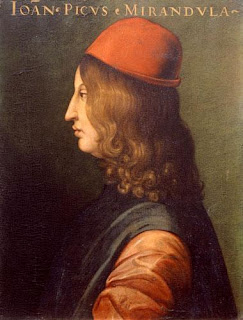Giovanni Pico, Count of Mirandola and Concord
I hear you! I hear you, you bunch of red hot, overzealous fanatics! You have been so eager in the search for ultimate truth that you have been pursuing me relentlessly for tiny scraps of the gargantuan knowledge that I keep locked inside my gallant brain. You have been clamoring at me, begging me, pleading me, entreating me, imploring me, beseeching me to share my prolific understanding with you and raise your inapt intellects to some more elevated (yet still decidedly humble) heights. At times it has been quite pathetic. But I am not one to judge or hold in disdain, thrustworthy followers! Here is the unabridged text that laid the basis for my first advent into the public gaze! Never again waste away tears, sobbing about how you would like to know more about Pico della Mirandola and Renaissance philosophy! It will all be periodically laid out for you in the coming days! FOR FREE!* Starting now:
“Let a certain holy ambition invade the mind, so that we may not be content with mean things but may aspire to the highest things and strive with all our forces to attain them: for if we will to, we can. Let us spurn earthly things; let us struggle toward the heavenly. Let us put in last place whatever is of the world; and let us fly beyond the chambers of the world towards the most lofty divinity.”
Strong, haughty words and elegant humanist rhetoric are what characterize Giovanni Pico della Mirandola’s (1463-1494) renowned Oration (1486), often carrying the further designation On the Dignity of Man, though its author never intended to add this extra heading and it expressly misses the thought underlying the original text. The Oration has been hailed as one of the defining texts of the Renaissance because it supposedly celebrates notions of human dignity and freedom and inspired the progression of the human intellect towards superior reason and the uncovering of the laws of nature. However, such a misreading was the result of a centuries-long process in philosophy which intended to reframe its illustrious history in Kantian terms, stressing the opposition between the passive reception of phenomenal nature and the noumenal freedom of the human mind to rise above this and eventually perceive the “thing-in-itself”, i.e. reality as it actually is.
This approach remained fashionable until at least the middle of the previous century, while at present Pico’s text is more generally recognized for what it really is: the introductory speech for the great public debate of 1487 in Rome, where the then 23 years old Pico intended to take on all comers in a dispute resolving the most vexing questions in magic, philosophy and theology and during which the young count of Mirandola wanted to defend his belief in the long chain of knowledge running through all ancient wisdom traditions (the prisca theologia) and the quintessential role of Kabbalah (Pico himself spelled it “Cabala”) in the illumination of Christian religion and salvation. Pico had drafted 900 specific propositions** for this occasion, ranging in subject matter from the nature of intelligible images to Christ’s descent into Hell to Egyptian symbolism in the Kabbalah. Sadly this proposed debate would never come about because a papal commission denounced thirteen of Pico’s theses and considered three of these to be explicitly heretical.
This led Pico to hastily write a defence, his Apology (1487), in which he attempted to justify the condemned propositions and offer some explanatory insights on the nature of heresy, its relation to matters of faith (namely, what is put forth in Scripture) and opinion (the insights of the Church Fathers) and thus ultimately the authoritative basis of Christian religion. In reaction to this Pope Innocent VIII put Pico under inquisitional observance and eventually denounced all the nine hundred theses and prohibited their use and distribution under threat of excommunication. The brash Pico therefore stole off to Paris, but at the Pope’s request he was there apprehended by the authorities and jailed. The timely intervention of Lorenzo de’Medici saved him however, and by the next year he was back safely in Tuscany, taking up residence in a villa in Fiesole provided to him by Lorenzo “the Magnificent”.
To be continued.....
*I am of course not responsible for any damaging influence that this text can have on the relatively poor quality of your grey mass, such as a sudden enlargment of the dorsolateral prefontal lobe (where the executive and logical functions are housed, natch).
**Nowadays commonly referred to as the 900 Theses or Conclusions (1486), Pico’s original publication of December 1486 carried no title, most probably because it was meant as a guide book accompanying the debate and not a pleasant read for long, cold winter nights.

No comments:
Post a Comment